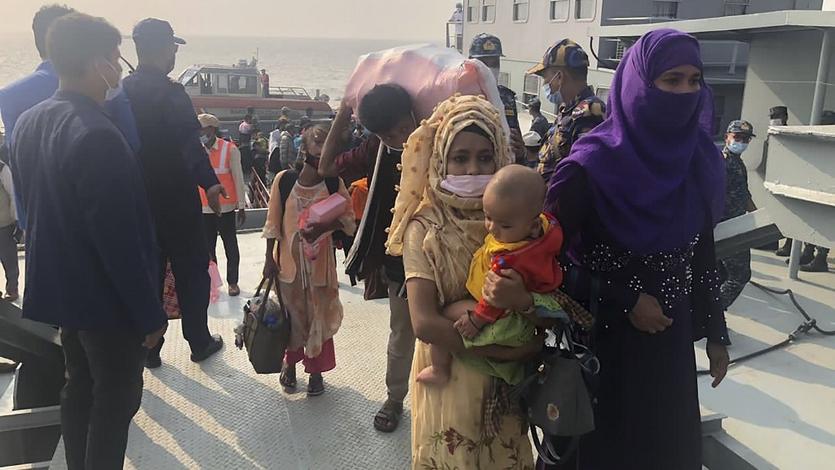 Rohingya refugees disembark from a Bangladesh Navy ship to the island of Bashar Char in Noakhali on December 4, 2020. (STRINGER / AFP)
Rohingya refugees disembark from a Bangladesh Navy ship to the island of Bashar Char in Noakhali on December 4, 2020. (STRINGER / AFP)
DHAKA - Bangladesh is moving nearly 4,000 more Rohingya Muslim refugees to a remote Bay of Bengal island, officials said on Wednesday, despite complaints from rights groups concerned about the site’s vulnerability to storms and flooding.
Dhaka has relocated more than 10,000 people to Bhasan Char island since early December from border camps where more than a million refugees live in ramshackle huts perched on razed hillsides.
Bangladesh says the relocation is voluntary, but some refugees from the first group that went there in early December spoke of being coerced
“Today 2,254 Rohingya people arrived and tomorrow we are expecting 1,700 plus,” Navy official Rashed Sattar said from the island.
Bangladesh says the relocation is voluntary, but some refugees from the first group that went there in early December spoke of being coerced.
READ MORE: Dozens of Rohingyas missing, 15 confirmed dead after boat capsizes
The government has dismissed safety concerns over the island, citing the building of flood defences as well as housing for 100,000 people, hospitals and cyclone centres.
It also says overcrowding in refugee camps fuels crime, while some Rohingya said frequent violence in the camps had driven them to relocate.
Once they arrive on Bhasan Char, the Rohingya, a minority group who fled violence in Buddhist-majority Myanmar, are not allowed to leave the island, which is several hours’ journey from the southern port of Chittagong.
ALSO READ: UN committee urges Myanmar to give citizenship to Rohingyas
Bangladesh has also drawn criticism for a reluctance to consult with the United Nations refugee agency and other aid bodies over the transfers.
The UN High Commissioner for Refugees says the agency has not been allowed to evaluate the safety and sustainability of life on the island.
“The process of relocating the Rohingya will continue... they are going there voluntarily for a better life,” Mohammad Shamsud Douza, the deputy Bangladesh government official in charge of refugees, said by phone from Cox’s Bazaar in southeastern Bangladesh.
“Our main priority is repatriating them to their homeland,” he said.
Bangladesh has called on Myanmar to move forward the stalled process of voluntarily repatriating Rohingya refugees, as international pressure mounts on the military leaders following a coup that reduces the refugees’ hopes of returning home.
“How long will we stay here under tarpaulins?,” said a 39-year-old refugee who moved on Wednesday with his family. “The little hope we had of returning to our homeland was shattered after the coup.”


